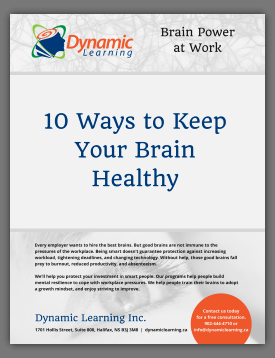At this time, in January, most of us are feeling a bit discouraged about our progress with one or more New Year Resolutions. In fact, we may have abandoned a goal we seemed to be moving toward that somehow got sabotaged.
Why does that happen to most people?
Your brain loves habits but it loves the habits it has already. It does not like changing habits.
Here is a short demonstration. To prepare, put down anything in your hands. Ready?
Now fold your arms. Then fold your arms the opposite way and hold that position. How does it feel? Most people say it feels wrong, awkward, uncomfortable.
Hold it a little longer. Right now, your brain is trying to get you to fold your arms your usual way. It is making you uncomfortable. Your brain is having a hissy fit.
Let’s analyze what happened.
When you folded your arms the usual way, you had no problem. It went as smooth as silk.
But when you folded your arms the opposite way, you had to slow down, look at your arms, think about it a bit more. And once you got them folded the opposite way, it felt wrong.
This is a simple and excellent demonstration of how your brain resists changing a habit.
It is why around January 15th each year, most people are giving up on their New Year Resolution and feeling guilty and defeated.
Here is why that happens.
The goal was too big to achieve; it wasn’t sustainable. For example:
- Stop eating any sugar this year
- Go to the gym three times a week
- Read 70 books in 2022
The completion date was too far in the future. The change expected was too much, too fast.
Let’s re-set for success.
First remind yourself of everything you have achieved, particularly what you have achieved in the last two years coping with this endless pandemic. Write out a list of your achievements.
With compassion for yourself, consider where you are in your life. Perhaps it is just time to give yourself a break.
Rest on your achievements and remind yourself of what you are grateful for. Be kind to yourself until you feel ready to improve the life you already have.
Work with your brain, not against it.
Pick one – and only one – change that will make your life even better. There are many many areas in your life you could improve but just pick one. Then break your process of change into very small, easy to achieve steps.
Back in 2010, Stanford Professor BJ Fogg, a researcher in behaviour change, set conventional wisdom aside and started over. Over the last eleven years, he developed, tested, and refined a technique he calls ‘Tiny Habits’. He has coached over 50,000 people in these tiny habits, measuring the results week by week and finding what really works and what doesn’t.
By reading Professor BJ Fogg’s book, The Tiny Habits that Change Everything, I was inspired to use his technique to establish a habit I have been struggling to establish for years.
I wanted to increase my aerobic exercise by promising myself to take a brisk 30-minute walk three times a week. I was stopped pretty quickly by horrible cold and icy streets. And by being too busy, too tired, and “not in the mood”.
After reading about Tiny Habits, I followed BJ Fogg’s recipe, which is:
- After I wash my hands (something routine that I do several times a day),
- I climb up and down the 12 steps to my basement for 30 seconds (something very easy).
- Then I yell “Awesome” to celebrate my new habit (and give my brain a dopamine boost).
Within a week, I was climbing my stairs for 5 minutes after each time I washed my hands, so now I am doing cardio exercise 20 to 30 minutes a day.
Why does this work so well?
Because it works with our brains. Our brains love habits and routines – the ones they already have. But they really don’t like changing habits or routines.
But if we already have a well-established routine, like washing our hands, our brains handle a small change in routine relatively easily.
Our brains also like feeling successful. If we can set things up so the behaviour change we want to make starts with a very easy change, and we celebrate that change each time we make it, the new habit develops painlessly.
In a relatively short time, we have made a change that improves our lives.


